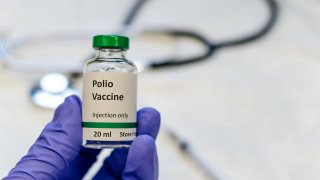
Following a case of polio that was confirmed in Rockland County in New York state on July 21, many people are scrambling to learn more about the severe disease and if they're protected against it.
On August 12, health officials announced that polio has also been detected in New York City wastewater.
Though local and federal health officials are still assessing how far polio has spread in the city and state, the virus has been circulating in the New York City area for months, the CDC said Tuesday. People who are not immunized against the virus are encouraged to get up-to-date with their vaccines immediately, the agency says.
Last month's confirmed case in Rockland County, New York happened in an unvaccinated adult who developed severe symptoms, including paralysis, and was hospitalized, according to the New York State Health Department.
Questions about this re-emergence of polio are trending on search engines like Google, with most folks interested in learning about the vaccine or their own immunization status. CNBC Make it talked to Jill Foster, a pediatric infectious disease physician at the University of Minnesota Medical School, to answer the most urgent questions.
Get Southern California news, weather forecasts and entertainment stories to your inbox. Sign up for NBC LA newsletters.
Your questions about polio, answered by a doctor
How concerned should I be about polio right now? Am I at risk?
The good news is if you're immunized against polio you have no reason to worry unless you're immunocompromised, Foster says.
Money Report
She recommends that immunocompromised individuals consult with their physician, who may then suggest checking their antibody levels. The results will help decide if they should get a polio booster or not.
Practicing good hand hygiene like washing your hands before eating is a great way to give yourself extra protection, too, she adds.
"The main way that polio is transmitted is fecal, oral, so all the things that we've been doing since the pandemic started, I think is a really good thing," Foster says. "And that's also going to protect against polio."
If you're not fully immunized against polio, you're most at risk for contracting the disease, she notes. This also includes children younger than one year of age, especially babies under 6 months; though they may have some protection from initial vaccines, they aren't fully immunized against polio yet, says Foster.
The CDC recommends that children get four doses of the polio vaccine, with one dose at the following ages: two months, four months, between six months and 18 months and between four and six years old.
"I would worry if I had an infant who lived in New York who has only received one or two shots and then was around people who don't wash their hands and aren't immunized," Foster says.
How do I know if I was I vaccinated for polio? Can I get a new vaccine just in case?
If your childhood immunization records are available to you, then you should search them for "IPV" which stands for inactivated polio vaccine. With four doses of IPV listed on your records, you have great protection against polio.
"If they have IPV on their vaccine record, then they're good," Foster says, "Some people are going to look for the words that actually say 'polio' and it's not going to say that."
Depending on where you were born or where you lived when you received your vaccines, "OPV" may be listed on your shot records, which is the oral polio vaccine. Several countries administer oral polio vaccines, according to the CDC.
If you cannot access your childhood vaccination records and want to get your polio vaccines for extra protection, Foster says there isn't any harm in doing so.
I was vaccinated as a kid, but can I get a booster?
At this time, polio boosters are not recommended for people who received their initial vaccines as a kid, Foster says. Officials believe that immunity lasts a very long time, she adds.
With a low number of cases, Foster doesn't foresee polio boosters being recommended unless there is an uptick. However, this could change depending on how widely polio spreads in the U.S., she notes.
"I think the people at the CDC are talking about it. It may come now that we're finding that there's wider circulation, more than people thought," Foster says, "It may come for certain geographies where we know that it's in the water."
Here's what else you should know
According to the CDC, no cases of polio have originated in the U.S. since 1979. But cases have been brought into the country by travelers, and the last known case of polio in the U.S. was detected in 2013.
Foster likens the effects of polio on the body to that of damaged wires in the electrical box in your basement. After polio travels through the 'wiring,' which she uses as a metaphor for nerves, "it ruins the wiring, and so you don't get any nerve signal going to your muscles and your muscles just stop working," Foster says.
Polio spreads through contact with the stool of an infected person or droplets from a sneeze or cough of an infected person, which is less common, according to the CDC. Other ways that you can contract the disease include:
- Picking up minute pieces of feces from the infected person on your hands and touching your mouth
- Putting objects that are contaminated with the feces of an infected person in your mouth
The severe impacts of polio include meningitis, an infection of the covering of the spinal cord and/or brain, and paralysis, the inability to move certain parts of the body, the agency says. And unfortunately, there is no cure for the virus and only treatment for symptoms.
Sign up now: Get smarter about your money and career with our weekly newsletter
Don't miss:






